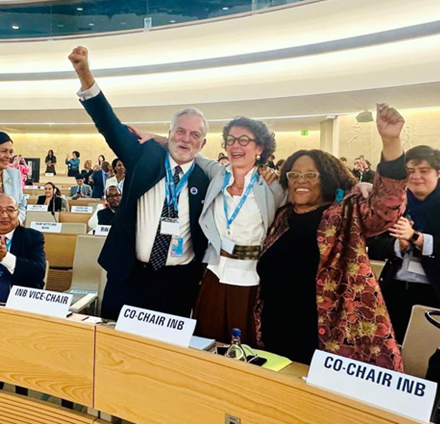As the 78th session of the World Health Assembly adopts the historic Pandemic Agreement, France and South Africa – together with Unitaid – convened a high-level event this week to translate commitments into concrete action. After three years of intense global dialogue, co-chaired by South Africa and France, the agreement represents a milestone towards ensuring the world is better prepared and more resilient in the face of future pandemics.

“The COVID-19 crisis exposed critical weaknesses in the global health architecture, particularly the lack of established systems to enable equitable access to lifesaving tools,” said Anne-Claire Amprou, French Ambassador for Global Health. “The Pandemic Agreement anchors the principle of equity throughout the PPR cycle and, in particular, guarantees a robust and comprehensive response system so that we are better equipped for the next pandemic.”
Key pillars of the agreement – such as technology transfer, sustainable production, and regional manufacturing – are already taking root. Technology transfer agreements from the United Kingdom and Korea to Diatropix in Senegal at the height of the pandemic established manufacturing capacity for rapid diagnostic tests in Africa, which is now being used to produce tests for HIV, malaria and other endemic diseases. Regional hubs in Kenya and Tanzania will strengthen health systems and increase access to medical oxygen supply, and a range of partners are working to address systemic barriers like regulatory challenges to help grow regional production capacity.
These initiatives are a few examples that show it is possible to build adaptable systems that can meet current needs and pivot quickly in the face of future health emergencies.
“Investing in pandemic preparedness is not a distraction from today’s urgent health needs – it’s part of the same solution,” said Precious Malebona Matsoso, former Director-General at the Department of Health, South Africa and Co-chair of the Intergovernmental Negotiating Body (INB). “When we bolster health systems to deliver broader, more equitable care, we are tackling long-standing challenges like HIV, maternal and child health, and non-communicable diseases, while also ensuring we can respond swiftly to future outbreaks. Preparedness and equity must go hand in hand.”
The stakes are high. With outbreaks of diseases such as mpox, Ebola, and Marburg increasing by 41% between 2022 and 2024, and with global funding for health emergency preparedness on the decline, the need for forward-looking, systemic solutions is more urgent than ever.
“Unitaid applauds the adoption of the Pandemic Agreement — a bold and essential step toward a safer future,” said Dr. Philippe Duneton, Executive Director of Unitaid. “We must now focus on delivering the tools that save lives in a crisis: vaccines, diagnostics, and treatments. Access cannot be an afterthought — it must be built in from the outset. This agreement lays the foundations for a global health system that is faster, fairer, and ready to respond when the next threat emerges.”
The side-event, titled “From negotiation to implementation: Operationalising the pandemic agreement,” was co-hosted by the Governments of France and South Africa and Unitaid in Geneva on 21 May 2025.
More information:
Kyle Wilkinson
Communications officer
+41 79 445 17 45
wilkinsonk@unitaid.who.int